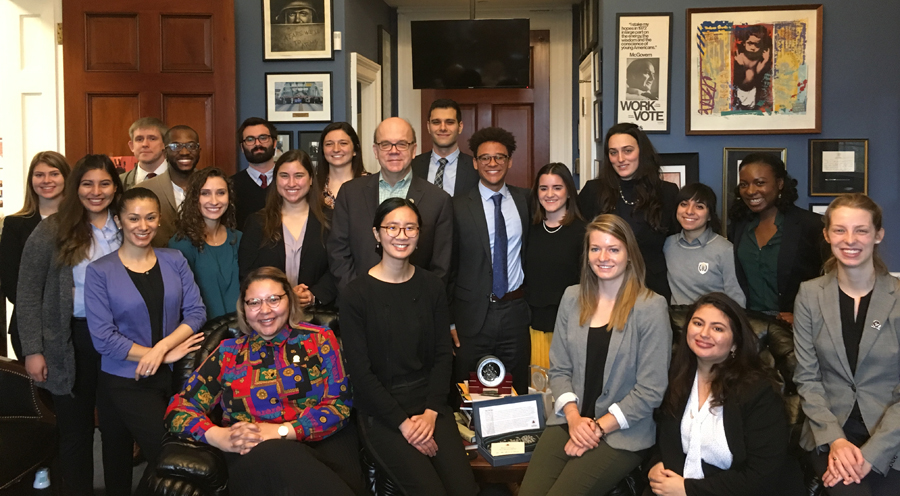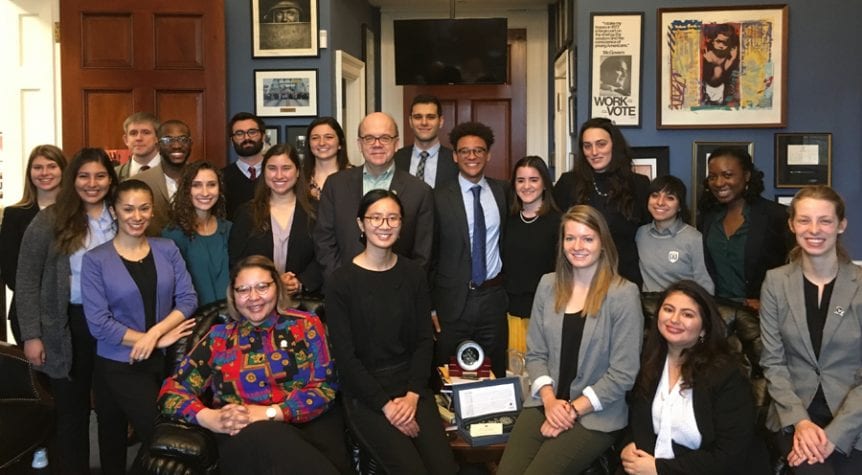 The 24th class of Emerson National Hunger Fellows pictured with Rep. McGovern and CHC staff
The 24th class of Emerson National Hunger Fellows pictured with Rep. McGovern and CHC staff
After working for six months at their field placement sites, the 24th Class of Emerson National Fellows have returned to Washington, D.C., where they are shifting the scope of their work from the community level to the national level of anti-hunger work and advocacy. During these first two weeks back in the District, the Fellows have presented their findings from their work in the field and participated in a thorough debrief and policy training to prepare them for the next phase of their fellowship.
The first week of policy training included a meeting with Representative James P. McGovern, CHC’s Board Chair. Rep. McGovern discussed the current state of anti-hunger and anti-poverty work on the Hill and took questions from the fellows on topics ranging from SNAP and other social safety net programs to running for elected office. Following the discussion the fellows met with the Members of Congress who represent the communities where they had served since last September, giving them a first-hand account of the state of hunger in their respective states and districts.
The next day the fellows gathered at the Rayburn House Office Building to give their final presentations on their projects at their field sites. Their presentations included their key insights and takeaways on effective anti-hunger work during their fellowship so far, and each concluded with a Q&A.
(Watch the fellows’ field work presentations here.)
That weekend, the fellows attended the National Anti-Hunger Policy Conference, sponsored by the Food Research and Action Center (FRAC) and Feeding America.
The following week the fellows took part in a range of training sessions, from an introduction to the legislative process to the politics of fighting hunger in America and policy solutions to inequality. Between info sessions, the fellows engaged in leadership building activities and group discussions, and reflected on what they learned at their field placement sites. Fellows heard from speakers representing many organizations, including the Center for Law and Social Policy, Center on Budget and Policy Priorities, Center for Native American Youth, and the National League of Cities.
“This training really illuminates the disconnect that exists between national policy and what’s happening on the ground. There are many misconceptions in Washington about what people are doing around the country and this fellowship is an opportunity to bridge that gap and share our experiences.”
—Erica McCoy, 24th Class Emerson Hunger Fellow
Following policy training fellows will begin working for national organizations and Federal agencies based in D.C. Fellows will be working on a variety of projects at their host organizations including conducting research, analyzing legislation, tracking regulatory reforms, and designing training programs and resources.
| Fellow | Policy Site Placement |
|---|---|
| Funke Aderonmu | RESULTS |
| Alex Boyd | Food Research and Action Center |
| Meg Buckley | Food Research and Action Center |
| Jamila Cervantes | Presbyterian Church USA – Office of Public Witness |
| María Cristina Chicuén | Center for Community Change |
| Amirio Freeman | National Law Center on Homelessness and Poverty |
| Sarah Goldman | National Farm to School Network |
| Corey Malone-Smolla | Feeding America |
| Valery Martínez | Center for the Study of Social Policy |
| Erica McCoy | Alliance to End Hunger |
| Rosa Rada | National Conference of State Legislatures |
| Paige Shortsleeves | Center for Law and Social Policy |
| Maggie You Ming Tsai | New America |
| Bardia Vaseghi | U.S. Dep’t of Health & Human Services – Administration for Children & Families |
| De’Sean Weber | Prosperity Now |
| Laura Yepez | U.S. Dep’t of Agriculture – Food & Nutrition Service |
The Emerson National Hunger Fellows Program is a one-year program that places 16 young leaders who share CHC’s passion for anti-hunger and anti-poverty issues at sites all around the country for six months to work with local non-profit anti-poverty/anti-hunger organizations. The fellows then come back to D.C. for the last six months of their fellowship to work with a new organization on solving these complex issues as they relate to institutional and policy changes on the national level.









